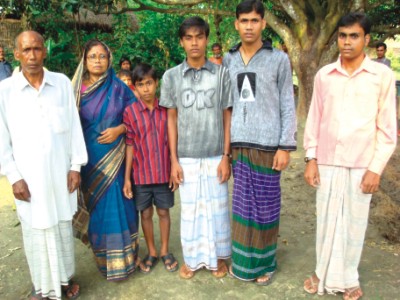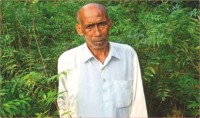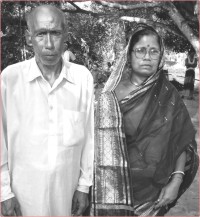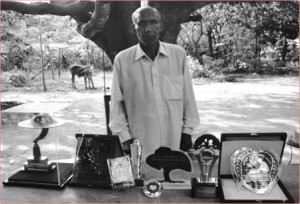| From Chapai Nawabganj
For a Greener Landscape
Selina Sheuly

Kartik Pramanik is a pioneer. He has one address, one identity. This 65-year-old hails from what can only be described as a remote village. He lives in a village 40 kilometers off of Chapai Nawabganj. Modern technology has not really touched this place. The roads are unpaved. The road becomes unsuitable for travel whenever there is a little bit of rain. Bicycles are the only vehicles that can be seen here. Of the 65 years of his life, 55 have been dedicated to trees. The man's presence is like that of a big shady tree in the middle of a desert.
 When he was a little boy, his father settled in this area. He was ten years old. Life was harsh. There were no trees around, the place was a desert. Dust and sand was everywhere. He asked his father why they had come here. His father gave him no satisfactory answer. He then told his mother that he wanted to plant trees. He then traveled 10 km off his village to Monakosha. There were trees that grew in people's gardens without much care. He would find seedlings and bring them home. He would plant them all around his village. Kartik says trees give peace. It does good for the soul. Kartik kept on planting trees like it was an addiction. He plants trees in the dead of night; he takes care of them. Because of this, some people call him crazy. Later he concentrated more on producing his own seeds for different types of plants and built up his own nursery. He sold some seeds to the city to earn some money. All this has become part of his routine. He hopes that one day his trees will grow big and provide some shelter for people. A barber by profession, Kartik Pramanik leaves his house for work early in the morning. After his work for the day is done, he sets out with his seeds to do some planting. When he was a little boy, his father settled in this area. He was ten years old. Life was harsh. There were no trees around, the place was a desert. Dust and sand was everywhere. He asked his father why they had come here. His father gave him no satisfactory answer. He then told his mother that he wanted to plant trees. He then traveled 10 km off his village to Monakosha. There were trees that grew in people's gardens without much care. He would find seedlings and bring them home. He would plant them all around his village. Kartik says trees give peace. It does good for the soul. Kartik kept on planting trees like it was an addiction. He plants trees in the dead of night; he takes care of them. Because of this, some people call him crazy. Later he concentrated more on producing his own seeds for different types of plants and built up his own nursery. He sold some seeds to the city to earn some money. All this has become part of his routine. He hopes that one day his trees will grow big and provide some shelter for people. A barber by profession, Kartik Pramanik leaves his house for work early in the morning. After his work for the day is done, he sets out with his seeds to do some planting.
 Each of his seedlings grows very large. Tired travelers find some comfort under the shade of his trees. Kartik's almost unnatural love for trees has gained a reputation that has spread to all parts of the town- the markets, the schools, even the mosques. Now his family members have joined in his efforts and have started planting banyan, neem, mango and other trees. Sometimes when he needs a few extra hands he pays people of the village to help him out. Some are spiteful, they destroy his plants. Cows and goats sometimes eat up his trees but Kartik is unperturbed, he just plants more. In 2005 he planted over 3,500 seedlings in Gopalganj. Currently about 250-300 of those trees survive. Right now there is a 44-year-old tree planted by him in Tarapur High School and College, and a 40-year-old banyan tree in Saghriya Eidgah. There are a number of other old trees in Shahpara Bazaar, Dakatpara Mosque and Babupara Primary School. Each of his seedlings grows very large. Tired travelers find some comfort under the shade of his trees. Kartik's almost unnatural love for trees has gained a reputation that has spread to all parts of the town- the markets, the schools, even the mosques. Now his family members have joined in his efforts and have started planting banyan, neem, mango and other trees. Sometimes when he needs a few extra hands he pays people of the village to help him out. Some are spiteful, they destroy his plants. Cows and goats sometimes eat up his trees but Kartik is unperturbed, he just plants more. In 2005 he planted over 3,500 seedlings in Gopalganj. Currently about 250-300 of those trees survive. Right now there is a 44-year-old tree planted by him in Tarapur High School and College, and a 40-year-old banyan tree in Saghriya Eidgah. There are a number of other old trees in Shahpara Bazaar, Dakatpara Mosque and Babupara Primary School.
Kartik is the most hurt when he sees people cutting down trees without good reason. Sometimes, there are obvious uses. But sometimes people just break off branches for no reason. Since he doesn't want people to even randomly break of neem branches to brush teeth with, he has decided to grow neem in his backyard and give away a bunch of neem brushes to people for free.
In his lifelong process of dealing with plants, Kartik has learnt a lot about the health and medicinal properties they often have. He shares his knowledge and resources with people of the village. He usually does this virtually free of charge.
 Even at this age, Kartik almost never takes a break. Besides trees, he's interested in catching fish from the Padma, although this is more for a livelihood. He sells his catch. People have said that if he had spent his money on his house instead of on all those trees, Kartik could have been living in a nice, big house by now. Besides being passionate about this himself, he has encouraged all seven of his sons to do the same. His eldest son Swapankumar has earned his BA degree, and his second son is in the army. The two youngest ones are in school. All three daughters have gotten married. Kartik has no conceits about what he does. Asked whether he knows about the day in the calendar marked out for planting trees, he says he doesn't. He has never heard of any special day. When asked for an estimate of how many trees he has planted in his lifetime, relatives and other villagers say it is about 250,000. Of course, it is impossible to tell how many of those currently survive. Even at this age, Kartik almost never takes a break. Besides trees, he's interested in catching fish from the Padma, although this is more for a livelihood. He sells his catch. People have said that if he had spent his money on his house instead of on all those trees, Kartik could have been living in a nice, big house by now. Besides being passionate about this himself, he has encouraged all seven of his sons to do the same. His eldest son Swapankumar has earned his BA degree, and his second son is in the army. The two youngest ones are in school. All three daughters have gotten married. Kartik has no conceits about what he does. Asked whether he knows about the day in the calendar marked out for planting trees, he says he doesn't. He has never heard of any special day. When asked for an estimate of how many trees he has planted in his lifetime, relatives and other villagers say it is about 250,000. Of course, it is impossible to tell how many of those currently survive.
Channel-I recently rewarded his efforts by giving him an agriculture award. Since his work has mainly involved trees, he has received a crest with the image of a banyan tree. He also won a crest from the forest department of Chapai Nawabganj. The Ramakrishna Mission has also given him an award for “Services to Mankind” along with a cash prize. He won a national award in 2006 from the Environment and Forest Ministry. Along with these, he has won a number of other awards.
Kartik Pramanik is not a rich man, although he certainly does not think of himself as poor. He remains philosophical about his condition. When asked to comment on natural disasters, he replied, “I don't understand all that stuff. What I do know is that if there were more trees all of us would be a lot better off.”
Copyright
(R) thedailystar.net 2007 |
